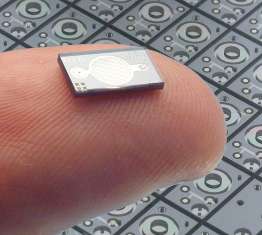| General care, nanotechnology | |
Debiotech and STMicroelectronics in partnership to manufacture microfluidic insulin pumpLausanne & Geneva Switzerland. A new agreement between Debiotech and STMicroelectronics (NYSE:STM) aims to bring to market a revolutionary microfluidic insulin pump that can be mounted on a disposable skin patch.
The nanopump will enable substantial advancements in the availability, treatment efficiency and the quality of life of diabetes patients. The original technology was awarded the Swiss Technology Award in 2006 and this agreement brings it closer to the market. Insulin pump therapy, or continuous subcutaneous insulin infusion (CSII), is an increasingly attractive alternative to individual insulin injections that must be administered several times a day. With CSII, the patient is connected to a programmable pump attached to a storage reservoir, from which insulin is infused into the tissue under the skin. Continuous delivery throughout the day, more closely mimics the natural secretion of insulin from the pancreas. The highly miniaturized disposable insulin pump combines Debiotech's expertise in insulin delivery with ST's strengths in manufacturing high-volume silicon-based microfluidic devices. Microfluidic technology allows the flow of very small amounts of fluids to be electronically controlled. This pump represents a significant step in the development and adoption of CSII therapy and the leading-edge technology will also find applications in many other biomedical applications. Today, existing insulin pumps are about the size of a pager. The new ST- enabled Debiotech miniaturized MEMS device is about one quarter the size of these existing pumps and can be worn as a nearly invisible patch on the skin. The small size frees the patient from concerns with holding the pump in place and concealing it under clothing. The MEMS-based Nanopump also provides better control of the administered insulin doses. Dosing precision is a critical factor in treatment efficacy and contributes to reducing adverse long-term consequences. The Nanopump is able to control delivery at the nanoliter level, very close to the physiological delivery of insulin. The device prevents over-dosing and detects under-delivery, occlusion, air bubbles and other potential malfunctions in the pump to further protect patients. As a disposable device, manufactured using high-volume semiconductor processing technologies, the MEMS-based Nanopump will also be much more affordable, allowing the patient or the health system to avoid the typical up-front investment associated with current pump solutions. The insulin Nanopump, developed by Debiotech and industrialized by ST, represents the first use of microfluidic MEMS technology in diabetes treatment. Functional samples have already been produced and the two partners expect that a fully industrialized product, in the form of a disposable cartridge, will be available in selected markets in 2008. Debiotech will remain responsible for the commercialization of the product through its licenses with major players in the medical device market. The industrialization efforts will leverage STMicroelectronics' growing experience in the biomedical market. Other bio-tech programs within ST's Microfluidic Division include the In-Check lab-on-chip platform, currently being applied to the detection of sepsis and Avian flu. "ST's increasing focus on applying its semiconductor manufacturing processes and growing experience in microfluidic biotech applications affords us the potential to improve lives for millions of people around the world," said Anton Hofmeister, Group Vice President and General Manager of ST's Microfluidic Division. "Working with Debiotech, a leading developer of innovative biomedical applications, we are committed to the industrialization of the insulin Nanopump that aspires to push the boundaries of diabetes treatment." "This collaboration with ST represents a major step in manufacturing of the Nanopump to make it available to a broad market at a cost compatible with a unique disposable use. ST is a world leader in MEMS manufacturing and we are very excited to be working together to bring a real innovation to diabetic patients, offering a new way to treat one of the most severe diseases of our century," said Frederic Neftel, MD, President & CEO of Debiotech SA.
|
 The
nanopump (right), which relies on microfluidic MEMS
(micro-electro-mechanical system) technology, is a breakthrough concept that
allows a tiny pump to be mounted on a disposable skin patch to provide
continuous insulin infusion.
The
nanopump (right), which relies on microfluidic MEMS
(micro-electro-mechanical system) technology, is a breakthrough concept that
allows a tiny pump to be mounted on a disposable skin patch to provide
continuous insulin infusion.